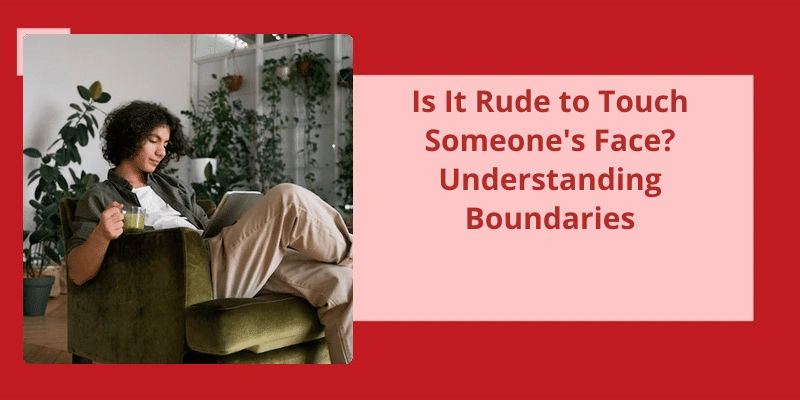The face is a delicate and sensitive area of the body, and it’s considered by many to be a private and intimate space. Whether it’s a family member, friend, or complete stranger, touching someone's face without their permission can be seen as disrespectful and invasive. Depending on the culture and context, it may even be considered rude or offensive. Therefore, it’s important to always consider the feelings and boundaries of others before reaching out to touch their face. While there may be instances where it’s acceptable or even welcome, it’s always best to err on the side of caution and ask for consent before taking such a personal step.
Is It OK to Tap a Stranger on the Shoulder?
Touching strangers is generally not considered appropriate behavior, especially if it isn’t in an emergency situation. Many people don’t like to be touched by people they don’t know or trust, and the cultural norms around touch can vary widely from person to person and from culture to culture. As such, it’s important to be aware of the boundaries of others and to respect their personal space.
In some situations, such as in emergency situations where someone needs help or needs to be alerted to potential danger, tapping a stranger on the shoulder may be necessary. However, even in these situations, it’s important to approach the situation with care and respect. Ensure that you aren’t putting yourself or the other person in danger and try to communicate clearly and calmly to avoid escalating the situation.
One important thing to keep in mind is that what’s acceptable in one culture or situation may not be in another. For example, some cultures may have a more relaxed attitude towards physical touch, while others may place a greater emphasis on personal space and boundaries. It’s important to be aware of these cultural differences and to respect them when traveling or interacting with people from different backgrounds.
How to Navigate Appropriate Physical Touch in Professional Settings, Such as in the Workplace or During Business Meetings.
- Always ask for consent before any physical touch.
- Be aware of cultural and social norms around physical touch.
- Consider the professional setting and the level of formality.
- Avoid physical touch if it could make someone feel uncomfortable.
- Limit physical touch to appropriate contexts, such as a handshake or a congratulatory pat on the back.
- Respect personal and physical boundaries.
- Err on the side of caution and refrain from physical touch if in doubt.
When it comes to social etiquette, there are certain actions that can be considered impolite or even offensive depending on the culture or context. One of these actions is touching someone’s head, which is often regarded as a disrespectful gesture. In many societies, the head is viewed as the most sacred part of the body, and any physical contact with it’s considered a violation of personal space. Let’s explore the reasons why touching someone’s head is generally considered rude and how to avoid committing this social faux pas.
Is Touching Someone’s Head Rude?
It’s a common cultural norm in many places around the world to avoid touching someones head without their permission. In some cultures, the head represents the spiritual center of the body, and touching it without permission can be seen as a violation of social and cultural norms. People may even see it as a sign of disrespect or aggression.
When it comes to children, touching their heads can also be seen as patronizing or demeaning. This can be especially true if the person doing the touching is seen as being in a position of authority or power. For example, a teacher or parent who touches a childs head without permission may be seen as belittling or infantilizing them.
This is particularly true in the context of a physical altercation or confrontation. A person who touches another persons head in this context is likely to be seen as attempting to dominate or control the situation.
Overall, social etiquette is critical when it comes to touching someones head.
The Role of Body Language and Non-Verbal Communication in Conveying Respect or Disrespect When Interacting With Others.
Body language and non-verbal communication play an important role in conveying respect or disrespect during interactions with others. These cues include posture, facial expressions, gestures, and tone of voice. Being mindful of these non-verbal cues can help one communicate respect and avoid unintentionally conveying disrespect.
While body language plays an essential role in communication, certain actions such as touching the face can send unintended messages. In particular, touching the nose during a conversation is often associated with deceit, while covering the mouth may indicate lying. Thus, it’s crucial to be mindful of how one’s gestures may be perceived by others to ensure effective communication.
What Does It Mean When Someone Touches Your Face While Talking?
Humans are social creatures and interact with one another on a daily basis. As such, nonverbal communication plays a crucial role in how we perceive and understand one another. One such nonverbal cue is touching another persons face during conversation. Face touching can be interpreted in various ways, from a sign of affection to a gesture of deception.
When someone touches your face during a conversation, it can be an indication of affection or intimacy. For example, a couple sharing a romantic moment may hold hands or stroke each others faces. This type of touch is usually gentle and can communicate a sense of closeness and trust between the individuals.
On the other hand, face touching can also be a subconscious reaction to nervousness or anxiety. For instance, a person may touch their face while speaking in public or during a job interview. This type of touch is usually brief and can serve as a way to self-comfort and alleviate stress.
Covering the mouth or nose can be a way to hide facial expressions or reduce the amount of information one gives away. Touching the nose is often associated with lying, as it can be a way to subconsciously signal the brain to shut down the sense of smell and focus on the words being spoken.
It’s essential to note that not all face-touching during a conversation is indicative of deception. Still, it can be helpful to observe the context and other nonverbal cues when interpreting this behavior. Moreover, keeping your hands away from your face while speaking can help avoid any miscommunication or misinterpretation of your intentions.
It’s crucial to be aware of these nonverbal cues and avoid any misinterpretation, especially in professional or formal settings.
It’s important to know that unwanted touching is never acceptable, and it’s crucial to seek help if you’ve experienced it. This type of behavior can be a form of sexual harassment and may even be considered a criminal offense. In the workplace, it’s essential to protect yourself and your rights.
Is It Illegal for Someone to Touch You?
When people think of touch, they often associate it with something positive. Touch can be a way to show affection or support, but what happens when touch goes beyond what’s consensual or appropriate? The truth is, nobody has the right to touch you without your permission. This is especially true in the workplace, where touching someone without their consent can be considered sexual harassment.
Sexual harassment is a serious matter, and it can come in many forms. Unwanted touching is one of those forms. If someone touches you in a way that makes you uncomfortable, it’s important to speak up. It may be difficult to confront the person who touched you, but doing so can help prevent the behavior from continuing. Additionally, if the touching was severe enough, it may constitute a crime.
It’s important to note that sexual harassment isn’t just physical. It can also be verbal, such as sexually suggestive comments, or nonverbal, such as leering or staring. Any behavior that makes you feel uncomfortable or intimidated has the potential to be considered sexual harassment. If you’re experiencing any type of unwanted behavior in the workplace, it’s important to report it to a supervisor or HR representative.
It can be difficult to know what to do if you’ve been touched without your consent. You may be feeling embarrassed or ashamed, but it’s important to remember that the behavior isn’t your fault. Nobody has the right to violate your personal space or make you feel uncomfortable. It’s important to seek support from friends, family, or even a professional counselor if needed.
Unwanted touching is never okay. It’s important to set boundaries and speak up if someone makes you feel uncomfortable. Remember that you aren’t alone and seek support if needed.
Differentiating Between Appropriate and Inappropriate Touch in Various Settings.
- Consent is key in any touching scenario.
- Inappropriate touch can be unwanted, uncomfortable, and harmful.
- Appropriate touch can be comforting, consensual, and necessary for medical or professional situations.
- Clear communication and body language are important in understanding appropriate and inappropriate touch.
- Parents and caregivers can teach children about appropriate and inappropriate touch to keep them safe.
- Social and cultural norms may influence what’s considered appropriate or inappropriate touch in different settings.
Source: Unlawful Touching – Sakkas, Cahn & Weiss, LLP
In many social settings, tapping someone’s shoulder to get their attention may be viewed as a breach of personal space. However, in certain contexts and cultures, the act of tapping someone on the shoulder is socially acceptable and even necessary for effective communication. In the Deaf community, tapping someone’s shoulder is a common way to get their attention, but many hearing individuals may be unaware of this cultural norm.
Is It OK to Tap Someone to Get Their Attention?
Boundary. However, in the Deaf community, tapping is a common way to gain someones attention. This is because communication is mainly visual in this culture. Sign language is the primary means of communication, so tapping is often necessary to convey important information.
Some may prefer a wave or a visual cue, so it’s always best to ask what someones preference is before assuming. Respect is key when interacting with someone who’s Deaf or hard of hearing.
In mainstream hearing culture, tapping someone on the shoulder is often seen as an invasion of personal space. It can be uncomfortable for some people, and it’s important to be aware of this when trying to get someones attention. It’s always recommended to use verbal communication first before resorting to tapping someone on the shoulder.
It’s important to be aware of workplace and social etiquette and to always approach situations with respect and sensitivity.
The Use of Tapping in Therapy or Counseling Settings
Tapping is a technique used in therapy or counseling settings where the client taps specific points on their body while focusing on their thoughts or feelings. This technique is believed to help reduce stress, anxiety, and negative emotions by promoting relaxation and a sense of calmness.
Conclusion
Therefore, it’s important to always ask for permission before touching someone's face, regardless of the nature of your relationship with them. Respect for personal boundaries is crucial in fostering healthy relationships and avoiding uncomfortable or confrontational situations. Ultimately, whether it's considered rude to touch someone's face depends on the cultural and social norms of the particular context, but it's always better to err on the side of caution and ask before touching. Remember: when in doubt, keep your hands to yourself.






